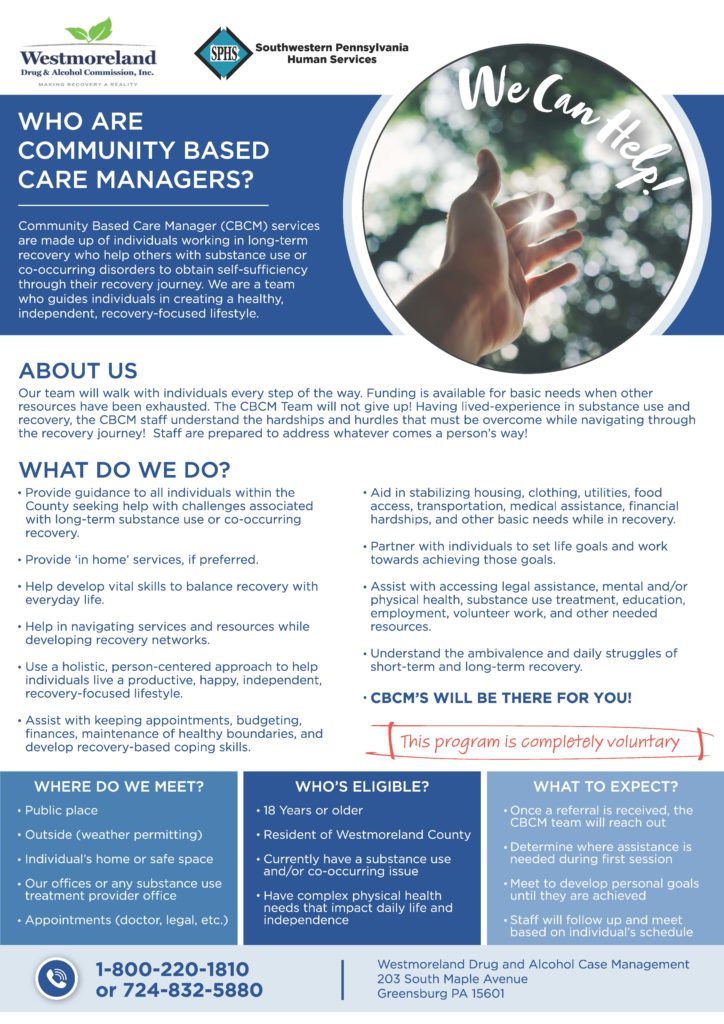
Any client, family member, and/or outside agency or hospital will call 1-800-220-1810 to receive a screening and schedule an appointment, if needed, for an assessment/evaluation to secure funds for treatment services. Referral sources include, but are not limited to the following: local hospitals, court system, County Assistance Office, CYS, etc.
Clients are screened and scheduled for an appointment, if necessary, according to the following guidelines: “Emergent Care” clients seeking detox, inpatient and/or halfway house services are screened and services scheduled immediately, with the goal of same day door-to-door treatment referral and linkage. Pregnant women, intravenous drug users, veterans, and other priority populations as determined by the Department of Drug and Alcohol Programs (DDAP) are also scheduled for an assessment immediately. All other clients seeking outpatient levels of care services are scheduled within 7 working days or are given the earliest available appointment.
Clients are offered appointments at office locations throughout the county. Emergent Care clients are also seen on-site at the Excela Westmoreland Latrobe and Frick Hospitals, on-site at the county jail, and in the community at a mutual meeting location. In order to secure WeDAC/SCA funding for all levels of care, clients must comply with all expectations of the County Assistance Office (CAO) prior to a referral being made. The D&A Case Management Staff will assist individuals in completing all CAO paperwork and/or online registration for medical assistance application.
Once a client has met all requirements for WeDAC/SCA funding, the client is referred to an WeDAC/SCA contracted treatment facility of their choice and a detox/residential bed date or evaluation date is scheduled for the client at the time of their initial assessment.
To access care during non-business hours, evenings and holidays, a professional answering service and D&A Case Management staff are available via an on-call cellular phone process, which is utilized for after hours emergency calls, thereby providing 24-hour emergency care response for clients and hospitals. These after hour services are accessed by contacting the D&A Case Management Unit at 1-800-220-1810.
Upon receiving the call, if the prospective client is in need of emergent care services after regular business hours, the D&A Case Manager will contact the providers to check on bed availability.
If a detoxification bed is available, the D&A Case Manager will arrange the after hours admission with the provider and the client. The D&A Case Manager will also direct the caller to go to the nearest hospital emergency room if he/she is experiencing a medical emergency.
The Westmoreland Drug and Alcohol Commission, Inc. (WeDAC), also known as the Single County Authority (SCA), subcontracts D&A Case Management services with Southwestern Pennsylvania Human Services (SPHS) Behavioral Health.
The D&A Case Management Unit is responsible for providing screening, assessment, and referral for treatment services to include requesting authorization of WeDAC/SCA funding for the most clinically appropriate levels of Drug and Alcohol Treatment. They may be contacted at 1-800-220-1810 (24/7).
SCA/WeDAC and D&A Case Management utilizes state and federal dollars for the uninsured and underinsured. Funding for treatment is available for clients who are eligible for medical assistance or who do not have private medical insurance. A sliding fee scale is used for clients who have income but are currently unable to pay the cost of treatment.
The D&A Case Management Unit will facilitate screening and level of care assessments to include D&A Treatment referrals for individuals of any payor source, this includes: individuals without insurance, individuals with Medicaid, and individuals with private health insurance.
Case Coordination is a voluntary, individualized client-care service designed for individuals with addictive disorders who have non-treatment needs. Case Coordination will facilitate work with individuals throughout their treatment journey, to address any barriers to treatment services. The goal of this service is to increase an individual’s level of self-sufficiency during their treatment experience, based on the client’s needs in at least one (1) or more of the following areas:
